Founder of one of China's largest internet companies looked south, all the way to Antarctica, for his first big challenge
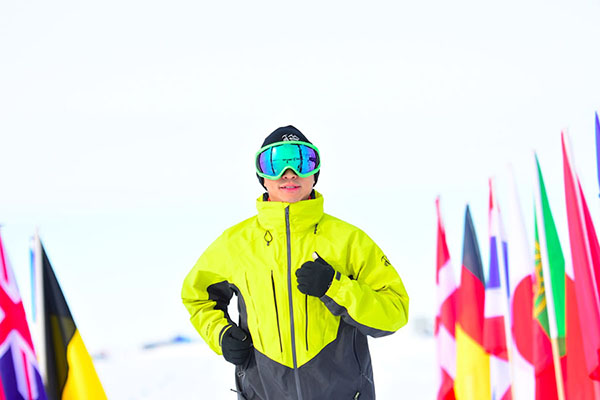 |
|
Pan running marathon in Antarctica last November. [Photo provided to China Daily] |
Chinese internet entrepreneur Pan Haidong can't be accused of being a shrinking violet.
When the 42-year-old set a goal of running marathons in all seven continents in two years, he started out with one of the most challenging around.
The founder and chairman of Hudongbaike, one of China's largest internet companies, took on the Antarctic Ice Marathon last year. The race bills itself as the only event held inside the Antarctic Circle on the continent's mainland.
"Imagine running in a world of ice, snow and strong ultraviolet rays all alone. It's highly possible that you get hurt or even die on the way," he says.
Pan, one of a limited number of Chinese to run a marathon in Antarctica, says the race – and long-distance running in general – holds many analogies and lessons pertinent to life.
In order to become one of the 55 people from 22 countries who participated in the 11th Antarctic Ice Marathon events in November, Pan had to make a 43-hour trip of nearly 25,000 km from Beijing to Dallas, then to Santiago and Punta Arenas in Chile, and then to Union Glacier on the 80th parallel south, a common jumping-off point for polar trips.
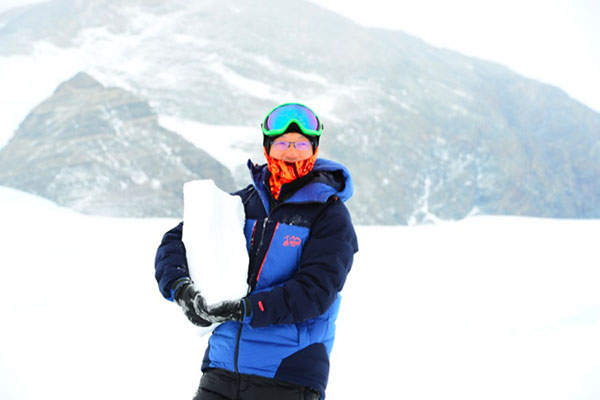 |
|
Pan running marathon in Antarctica last November. [Photo provided to China Daily] |
Pan and other runners flew into the Antarctic Circle aboard a Russian transport plane. During the trip, Patrick Ngan, a runner from Hong Kong who had been in the North Pole Marathon, briefed them on the conditions they might encounter.
Pan says he recalls Ngan warning them that with temperatures reaching as low as -30 C, they had to guard against heat loss. Among the worst-case scenarios, they could end up with frostbitten toes or even get lost and lose consciousness.
Pan got really scared and almost decided to withdraw. But he finally decided to go for it.
"It's a matter of life, but it was an once-in-a-life opportunity," he says, adding that it was kind of like starting a business.
"Things are not as scary as it sounds when you really put your hands, or feet, into it. And the only thing you've got to do is to keep on going when you feel you can't."
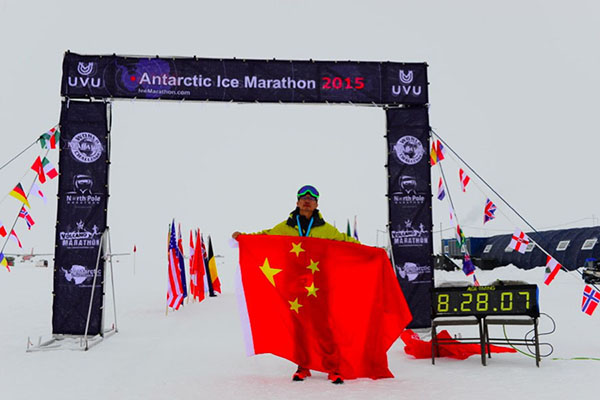 |
|
Pan running marathon in Antarctica last November. [Photo provided to China Daily] |
Pan says when they arrived, it was clear this was like nowhere else he had been.
"The wind, sunlight, clouds, and everything else were different there, maybe because of the high latitude."
Organizers, he says, worked hard to keep everyone safe. Flags were placed every few meters to keep them on track, crews that included doctors patrolled the racecourse, and radar was used to detect cracks in the ice. Runners wore special suits, with layers to keep them warm but not too sweaty, eye protection and nonskid boots.
"Even so, an old Japanese man at his 70s felt dizzy not long after we set out. He couldn't find his way in all the bright whiteness around, and I was quite worried when we ran out of each other's sight," Pan says.
Still, everyone completed their race, which included 47 runners in the full 42.195 km marathon and eight in the half-marathon. Great Britain's Brian Webb and Chile's SilvanaCamelio took the men's and women's marathon titles, with Webb posting a time of 3:35:25 and Camelio 4:40:01, according to the event's website.
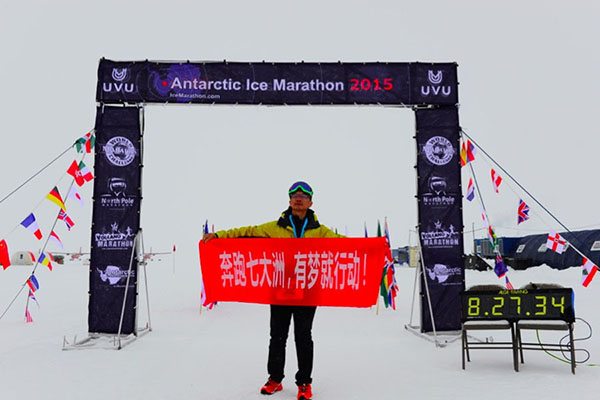 |
|
Pan running marathon in Antarctica last November. [Photo provided to China Daily] |
Pan says he finished in eight hours and 20 minutes, which he was quite happy with.
"Marathon is the best sport because it's not about ranking, but about competing with yourself. I won, myself, by not giving up."
Pan says it even helps him in his business, which was launched in 2005 and includes the world's largest Chinese encyclopedia.
"Running empties my mind, taking me away from my company, which occupies every other minute of my life. Running refreshes me, so that I do better with my career."
Pan says though he loves both, he keeps his running separate from his business.
"You're lucky if you are fond of something, even luckier if you have the time and money to keep doing it," says Pan.
He says another benefit to running marathons is the people he meets, all of whom are driven.
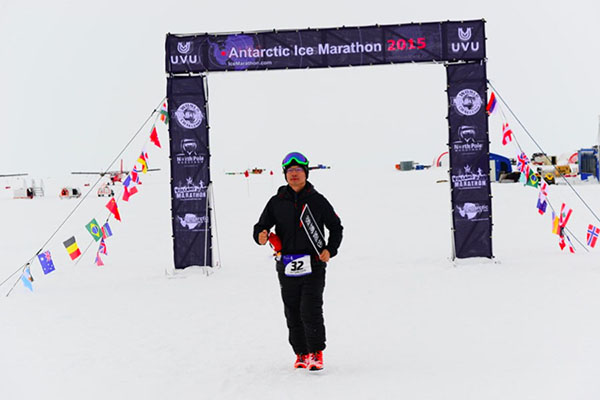 |
|
Pan running marathon in Antarctica last November. [Photo provided to China Daily] |
"When I run, I'm with CEOs of leading companies, hot properties, young mothers successful in business, and even retired soldiers with artificial legs," he says.
He says it's true that Chinese participation in international marathons is evidence of the country's economic progress, with number of wealthy and middle-class Chinese rising quickly. The Antarctic race cost him a total of over 100,000 yuan ($15,377; 13,676 euros), about 1.3 times the average annual income in Beijing in 2014 according to a government report.
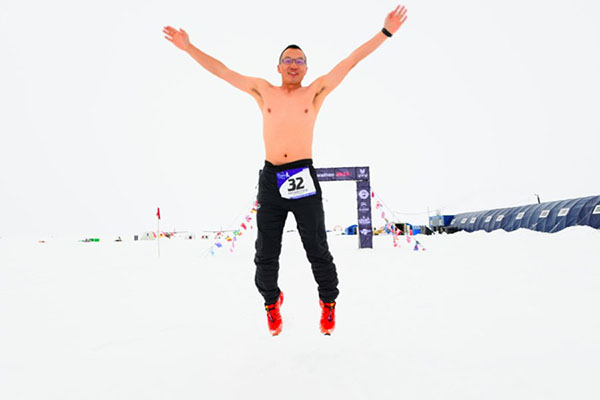 |
|
Pan running marathon in Antarctica last November. [Photo provided to China Daily] |
However, Pan says he sees running as a personal journey, pure and simple, that has helped him comprehend things he had not understood before.
"We are always educated not to lose sight of the starting line, but you'll find out that life is like a marathon – the starting line doesn't matter that much, but what's important is to keep a pace that you're comfortable with."